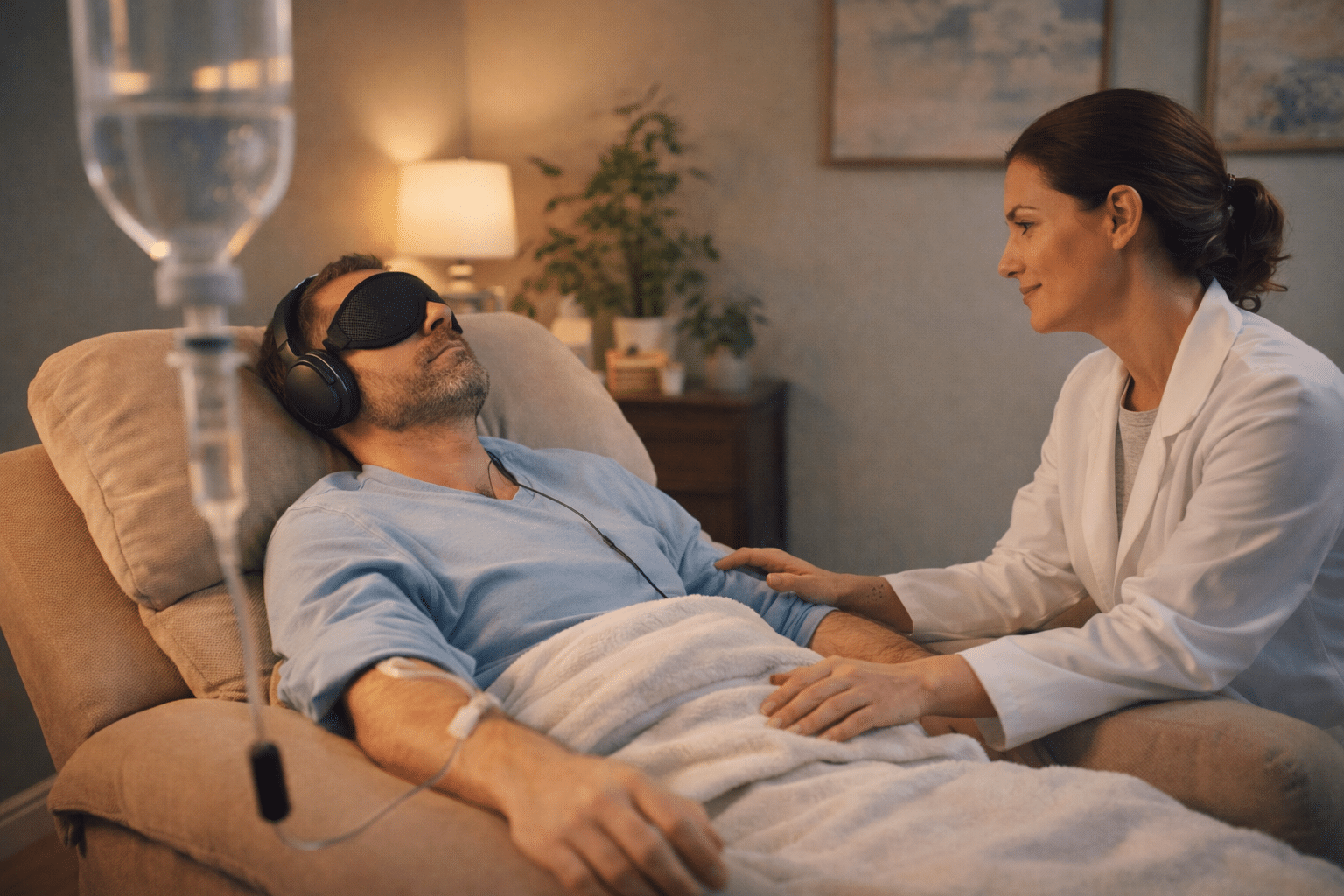Sleep problems are not always just about being tired. Sometimes they are tied to deeper issues, such as anxiety, depression, or other mental health conditions. For many people, sleep medications feel like an easy fix. But those pills often do more than help you fall asleep. They can shape your mood, your thoughts, and even the way your brain recovers.
That is why it matters to understand how sleep and mental health connect. More importantly, it helps to know how medications used for sleep affect people with psychiatric disorders. Because for some, the wrong medication can do more harm than good.
Sleep Disturbances as a Symptom of Psychiatric Conditions
Insomnia is rarely random. It usually shows up alongside something else. In a 2024 national study published in SLEEP, researchers tracked over 176,000 children and young adults who had just been diagnosed with insomnia. Roughly 74% of them also had a psychiatric diagnosis. Anxiety, depression, and ADHD were the most common.
That overlap is not a coincidence. Psychiatric disorders affect the same brain systems that control sleep. Therefore, when something like depression throws off a person’s emotional balance, their sleep can get thrown off, too.
Adults are not exempt. Another study from the Annals of General Psychiatry found that people with bipolar disorder or schizophrenia were especially likely to experience insomnia. Sleep apnea was also more common among people with depression. It is not always clear which comes first, the sleep issue or the mental health condition, but either way, the two are usually connected.
Common Sleep Medications and Their Effects on Mental Health
Doctors use a wide range of medications to support sleep, especially when patients are also managing a psychiatric condition. Each type works differently and carries its own set of trade-offs. The effects on sleep are one thing. The effects on mental health are another.
Medications most frequently prescribed include:
- Trazodone: Commonly prescribed for insomnia in patients with depression. It promotes sleep but may interfere with REM when used long-term.
- Hydroxyzine: A prescription antihistamine that helps with anxiety and sleep. Often given as a first-line option in younger patients.
- SSRIs (Selective Serotonin Reuptake Inhibitors): These antidepressants can help with mood disorders. However, some may disrupt sleep or reduce sleep quality, especially early in treatment.
- Alpha-agonists: Used primarily in children with ADHD. These medications lower nervous system activity, which can make it easier to fall asleep.
- Benzodiazepines and z-drugs: Fast-acting medications that induce sleep quickly. While effective, they carry risks like dependency, memory problems, and rebound insomnia.
Youth and Psychiatric Medication Trends
Children and young adults experience a unique set of challenges when it comes to sleep and mental health. In the SLEEP study, more than 73% of children diagnosed with insomnia had at least one psychiatric diagnosis in the previous six months. The top three were anxiety disorders, depression, and ADHD.
Patterns shifted by age. Among children without psychiatric diagnoses, hydroxyzine and alpha-agonists were common choices. Among older youth, trazodone was most frequently prescribed, even when no comorbid mental health condition was present.
The presence of psychiatric conditions increased the likelihood of multiple prescriptions. For example, older youth with anxiety or depression were more likely to receive trazodone, SSRIs, and z-drugs all at once. This raises concerns about drug interactions, especially when the goal is better sleep and emotional balance at the same time.
The Importance of an Accurate Diagnosis
When symptoms overlap, it can be hard to know where to start. Narcolepsy, for example, is often confused with ADHD or depression because of shared signs like fatigue and brain fog. However, treating narcolepsy with antidepressants or stimulants would miss the mark entirely.
Collaboration between psychiatrists and sleep physicians helps reduce this confusion. When providers look at the full picture, including sleep quality, mood, and daily function, they can avoid overmedicating or mismanaging the case.
This kind of teamwork also helps patients avoid medications that cancel each other out. A stimulant might improve focus but worsen insomnia. A sedative might ease anxiety but lead to next-day grogginess or mood instability.
When Sleep Medications Help and When They May Hurt
For some patients, sleep medications provide real relief. Trazodone, hydroxyzine, or even ketamine-assisted therapy may help break a harmful pattern of sleepless nights and unstable moods. In situations where therapy or lifestyle changes are not enough, a well-chosen medication can restore a sense of normalcy.
But these benefits come with limits. According to the Annals of General Psychiatry, some medications, such as sedatives and antidepressants, can worsen sleep disorders over time. This includes suppressing REM, altering deep sleep, or increasing the risk of sleep apnea. The more comorbid conditions a patient has, the higher the risk of complications.
There is also the question of long-term effects. Medications that seem helpful now may slowly reduce emotional resilience, blunt motivation, or interfere with memory. As a result, some clinicians reserve them for short-term use or crisis management rather than long-term care.
A Holistic Approach to Mental Health and Sleep
Good sleep hygiene matters, but it is only part of the equation. For lasting improvement, patients often need a layered approach. This includes therapy, medication management, and behavioral support.
The University of Michigan’s MHealthy team recommends the following practical strategies that improve sleep naturally:
- Regular bedtimes
- A quiet and dark room
- Reduced screen time before bed
- Daily movement
Therapies like CBT-I, or cognitive behavioral therapy for insomnia, can help patients shift their habits and reduce dependency on medication. These approaches work especially well when paired with psychiatric support that addresses the root causes of sleep trouble.
Patients with complex or treatment-resistant conditions may benefit from advanced interventions like transcranial magnetic stimulation (TMS) or ketamine therapy. These tools offer relief without the long-term risks of traditional sleep medications. They are also valuable when insomnia is linked to deeper psychiatric symptoms.
How Zeam Health & Wellness Supports Your Sleep and Mental Health
We treat mental health and sleep as a connected system. That means listening to your full story, not just your symptoms. We work with you to find solutions that improve your quality of life without adding complications.
Our psychiatric team offers personalized care at our Sacramento, Roseville, and Folsom locations. If you are struggling with sleep and mental health, let us help.




